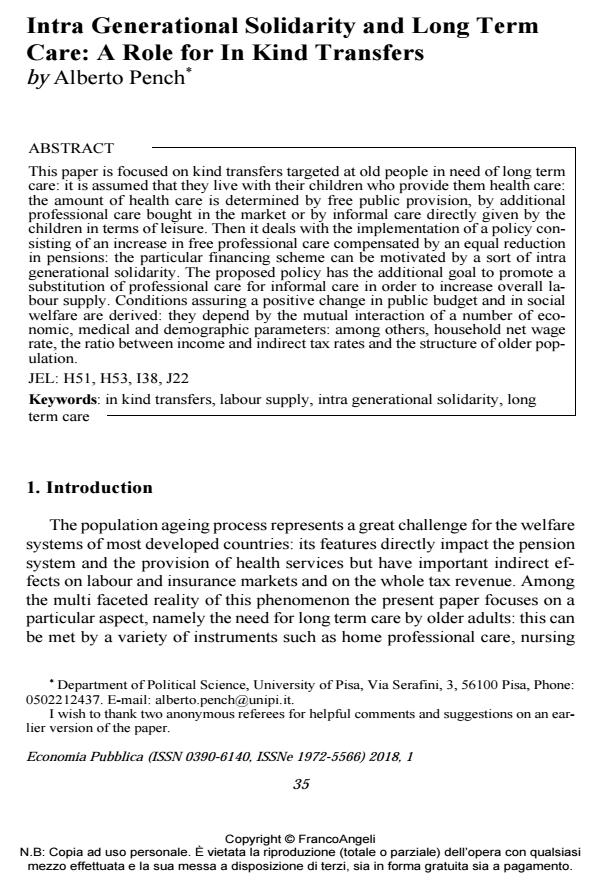Intra Generational Solidarity and Long Term Care: A Role for In Kind Transfers
Titolo Rivista ECONOMIA PUBBLICA
Autori/Curatori Alberto Pench
Anno di pubblicazione 2018 Fascicolo 2018/1 Lingua Inglese
Numero pagine 23 P. 35-57 Dimensione file 245 KB
DOI 10.3280/EP2018-001002
Il DOI è il codice a barre della proprietà intellettuale: per saperne di più
clicca qui
Qui sotto puoi vedere in anteprima la prima pagina di questo articolo.
Se questo articolo ti interessa, lo puoi acquistare (e scaricare in formato pdf) seguendo le facili indicazioni per acquistare il download credit. Acquista Download Credits per scaricare questo Articolo in formato PDF

FrancoAngeli è membro della Publishers International Linking Association, Inc (PILA)associazione indipendente e non profit per facilitare (attraverso i servizi tecnologici implementati da CrossRef.org) l’accesso degli studiosi ai contenuti digitali nelle pubblicazioni professionali e scientifiche
This paper is focused on kind transfers targeted at old people in need of long term care: it is assumed that they live with their children who provide them health care: the amount of health care is determined by free public provision, by additional professional care bought in the market or by informal care directly given by the children in terms of leisure. Then it deals with the implementation of a policy consisting of an increase in free professional care compensated by an equal reduction in pensions: the particular financing scheme can be motivated by a sort of intra generational solidarity. The proposed policy has the additional goal to promote a substitution of professional care for informal care in order to increase overall labour supply. Conditions assuring a positive change in public budget and in social welfare are derived: they depend by the mutual interaction of a number of economic, medical and demographic parameters: among others, household net wage rate, the ratio between income and indirect tax rates and the structure of older population.
Keywords:In kind transfers, labour supply, intra generational solidarity, long term care
Jel codes:H51, H53, I38, J22
- Alessie R., Angelini V. and Pasini G. (2014). Is It True Love? Altruism Versus Exchange in Time and Money Transfers. De Economist, 162: 193-213.
- Bauer J.M. and Sousa-Poza A. (2015). Impacts of Informal Caregiving on Caregiver Employment, Health, and Family. Journal of Population Ageing, 8(3): 113-45.
- Blackorby C. and Donaldson D. (1988). Cash versus Kind, Self Selection and Efficient Transfers. American Economic Review, 78(4): 691-700.
- Bolin K., Lindgren B., and Lundborg P. (2008a). Informal and formal care among single-living elderly in Europe. Health Economics, 17(3): 393-409.
- Bolin K., Lindgren B., and Lundborg P. (2008b). Your Next of Kin or Your Own
- Career? Caring and Working Among the 50+ of Europe. Journal of Health Economics, 27: 718-38.
- Bonsang E. (2009). Does informal care from children to their elderly parents substitute for formal care in Europe?. Journal of Health Economics, 28: 143-154.
- Carmichael F., Charles S. and Hulme C. (2010). Who Will Care? Employment Participation and Willingness to Supply Informal Care. Journal of Health Economics, 29: 182-90.
- Cremer H., Pestieau P. and Roeder K. (2016). Social Long-Term Care Insurance with Two-sided Altruism. Research in Economics, 70: 101-9.
- Currie J. and Gahvari F. (2008). Transfers in Cash and in-Kind: Theory Meets the Data. Journal of Economic Literature, 46: 333-83.
- Engers M. and Stern S. (2002). Long-Term Care and Family Bargaining. International Economic Review, 43: 73-114.
- Gahvari F. (1994). In-kind Transfers, Cash Grants and Labour Supply. Journal of Public Economics, 55: 495-504. DOI: 10.1016/0047-2727(93)01412-4
- Gahvari F. (1995). In-Kind versus Cash Transfers in the Presence of Distortionary Taxes. Economic Inquiry, 33(1): 45-53.
- Guesnerie R. and Roberts K. (1984). Effective Policy Tools and Quantity Controls. Econometrica, 52: 59-86. DOI: 10.2307/1911461
- Jousten A., Lipszyc B., Marchand M. and Pestieau P. (2005). Long Term Care Insurance and Optimal Taxation for Altruistic Children. Finanzarchiv, 61: 1-18. DOI: 10.1628/0015221053722514
- Klimaviciute J. and Pestieau P. (2018). The Public Economics of Long-Term Care. A Survey of Recent Contributions. Annals of Public and Cooperative Economics, 9: 49-64.
- Leonesio M.V. (1988). In-Kind Transfers and Work Incentives. Journal of Labor Economics, 6(4): 515-29. DOI: 10.1086/298194.
- Murray M.P. (1980). A Reinterpretation of the Traditional Income-Leisure Model, with Application to In-Kind Subsidy Programs. Journal of Public Economics, 14(1): 69-81. DOI: 10.1016/0047-2727(80)90005-5
- Pestieau P. and Sato M. (2008). Long-Term Care: the State, the Market and the Family. Economica, 75: 435-54.
- Stabile M., Laporte A. and Coyte P.C. (2006). Households Responses to Public Home Care Programs. Journal of Health Economics, 25: 674-701.
- Van Houtven C.H., Coe N.B., and Skira M.M. (2013). The Effect of Informal Care on Work and Wages. Journal of Health Economics, 32: 240-52.
- Van Houtven C.H. and Norton E.C. (2004). Informal Care and Health Care Use of Older Adults. Journal of Health Economics, 23: 1159-80.
- Zweifel P., and Strüve W. (1998). Long-Term Care Insurance in a Two-Generation Model. The Journal of Risk and Insurance, 65: 13-32. DOI: 10.2307/253489
Alberto Pench, Intra Generational Solidarity and Long Term Care: A Role for In Kind Transfers in "ECONOMIA PUBBLICA " 1/2018, pp 35-57, DOI: 10.3280/EP2018-001002